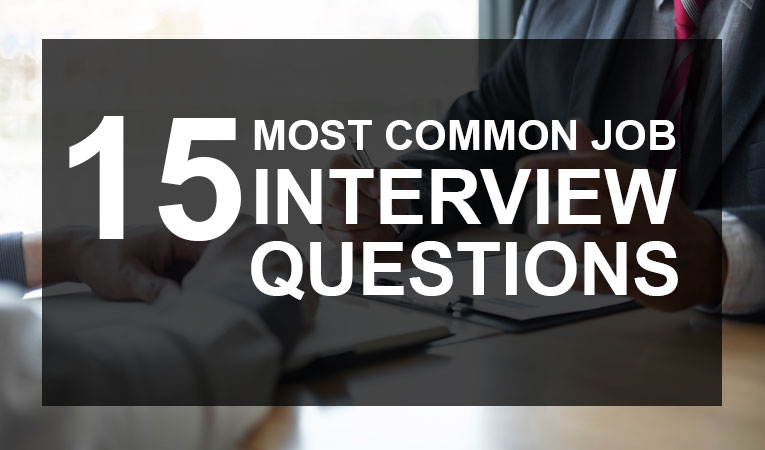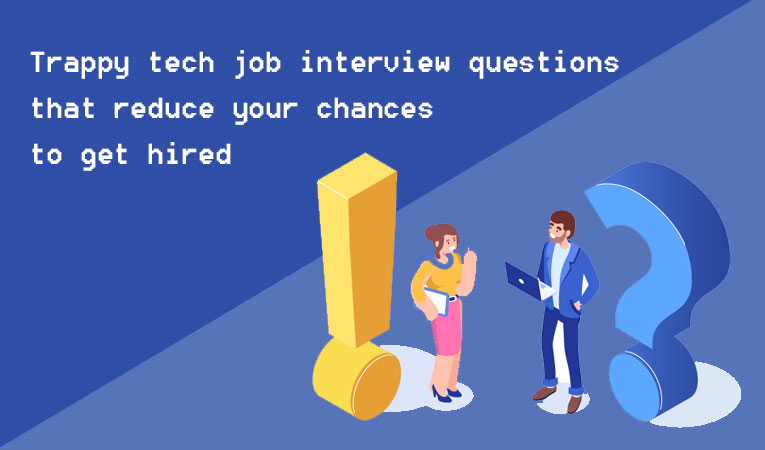15 Most common job interview questions and how to answer them

If you’re preparing for your next job interview and wondering what sort of questions would be asked by your hiring manager, believe it, you are not alone. Everyone preparing to crack an interview has such thoughts. While there’s no particular way to know what questions would be asked by the recruiter, certainly, we can help you with a list of popular questions along with suggestions for answering them.
Top 15 common interview questions and best answers
Tell me about yourself
This is one simple question that you are most likely to be asked during an interview. Talk about your current role, your educational background and why you’re an ideal fit for the position. Do not reveal too much personal information but yes, you can share about your personal interests like your hobbies etc.
Why do you want this job?
It is a way to evaluate whether a candidate has researched the company or not. The ideal way is to do your homework well, learn about the company’s services, products, and work culture. In your reply, mention the aspects of the company that appeal to you and why you see yourself as a good fit.
Why should we hire you?
This is another common question asked by hiring managers to understand whether you possess the relevant skills to take up this role. While responding to this question make sure you are confident and precise. Explain that you not only can do the work but also can deliver great results. You can easily adjust to the team and company’s work culture; and that you’re a better hire than the rest of the candidates.
What is your greatest strength?
This question is often asked just to determine how well you are qualified for the position. Here, just don’t start your answer with a list of adjectives. Rather, mention one or two qualities that are relevant for this position and make you a great fit for the role. You can share a story to display your strengths.
What is your greatest weakness?
While responding to this question, ensure that your answer is framed around positive aspects of your skills and abilities. It is a great opportunity for you to display that you’re well-qualified for this job, can take on challenges in the workplace, and can learn new skills. You can also share some examples of skills that you’ve improved and how you have recognized your weaknesses and taken corrective measures.
What is your greatest professional achievement?
Your track record of incredible achievements in your previous jobs can get you extra brownie points during an interview. So, do not hesitate to share the details with your employer as that can help you get your dream job.
How do you deal with challenges or conflict at work?
Don’t panic when you are asked this question during a job interview and do not pretend that you’ve never had one. Be honest about the challenging situation that you’ve ever faced. The interviewer here is only looking for proof that you are ready to take on these kinds of work issues and are sincere enough to resolve them. Stay calm and professional when you describe the story and focus more on the resolution part than the conflict.
Why do you want to leave your current job?
This question is mostly asked in all the interviews as every interviewer wants to know the reason for you wanting to leave your present organization. So, prepare your answer well. One caution of advice – do not speak negative of your current job or organisation. Sound positive and frame your answer in such a way that you’re looking forward to taking up new opportunities outside your comfort zone.
How do you handle stress and pressure?
Here, the employer wants to know how you can handle workplace stress when things don’t go smoothly at work. Can you work under high-level stress? How would you react under such stressful times? Do not say that you’ve never experienced stress at work because that will be a straight lie. The ideal way to respond is to share an example of how you’ve courageously handled stress in a previous position.
Tell me about a time when you demonstrated leadership skills
Give a well-thought answer and understand that you don’t need a title of a leader to display your leadership skills. Mention the time when you headed a project, motivated your team members to complete the task within timelines, and how you took the initiative to streamline the process. Let your interviewer know that you can not only work as a great team player but if required, can also lead the team.
What are your goals for the future?
Through this question, the recruiter intends to understand your long-term goals - do your future career plans align with the position that they have.
This question is formulated to determine whether you’ll stick around or just move on as soon as you find a better option. While responding, ensure that your answer is focused on the job and the company and tell the hiring manager that the position matches with your long-term goals.
What are your salary expectations?
The best way to answer this question is to calculate your salary expectations well in advance. Do little research over the internet on how much similar roles get paid. This will give you an idea of what to say to the hiring manager. You can give a salary range of your expected remuneration or if you’re hesitant to do so, ask them about their salary range for therole.
Where do you see yourself in five years?
Most recruiters do ask this question and it is good to go prepared in advance. Be honest and precise about your future goals. Do not give unreasonable answers. The employer or a hiring manager is only trying to understand whether you’ve set a realistic expectation for your goal or not. They want to know your career aspirations and if the position that they offer fits with your goals or growth.
When can you join?
Give a realistic answer that works both, for you and the company. If you can join immediately, convey accordingly. State clearly if you have to serve a notice period as per your current company’s policy. People will understand that you plan to wrap things up the right way and want to leave the organisation on a positive note.
Do you have any questions to ask?
Don’t miss the opportunity to ask if there’s anything racing in your mind at that very moment. It is a wrap-up question so it can be anything like your office timings, targets, working days so on and so forth. It is good to know everything before as it helps in making the right decision.










